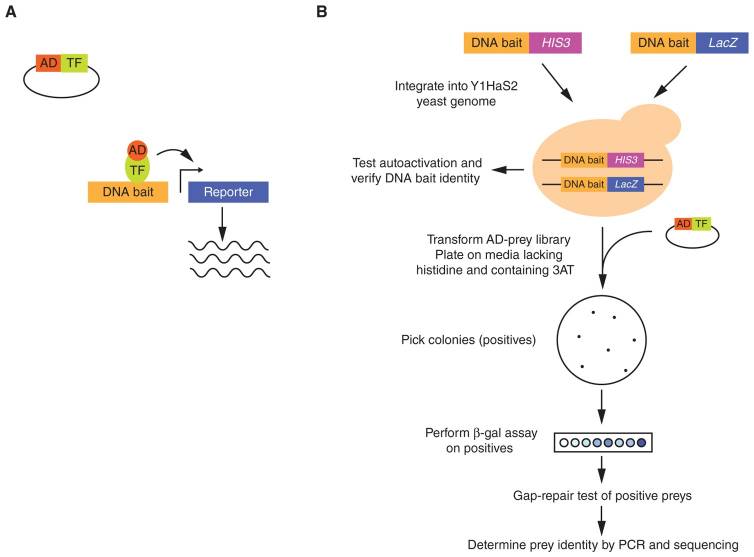The interaction between proteins and DNA is involved in almost all cellular functions and is critical in transcriptional regulation. A new yeast one-hybrid (Y1H)-based method for the detection of DNA-proteins interactions has been developed, which uses transcription factors (TF) as the center of the recognition components and is named TF-centered Y1H. The Y1H assay provides a powerful DNA-centered method that complements TF-centered methods such as chromatin immunoprecipitation (ChIP) to identify TFs that can bind the DNA sequence of interest.
 Figure 1. The principles underlying the yeast one-hybrid technique and the pipeline for library screening. (Fuxman, B. J. I. et al., 2016)
Figure 1. The principles underlying the yeast one-hybrid technique and the pipeline for library screening. (Fuxman, B. J. I. et al., 2016)
Lifeasible provides our customers with TF-centered Y1H technology services that enable accurate, rapid, and efficient identification of TF-identified components. We identify DNA sequences that bind transcription factors by constructing random DNA libraries and then screening the libraries using TF-centered Y1H technology.
The transcription factors of interested were used as bait and alibrary of random-short DNA sequences sufficient to binds TFs are cloned into the pHIS2 vector as prey TF-centered Y1H could quickly identify the motifs bound by a defined TF, representing a reliable and efficient approach with the advantages of Y1H.
You can use our TF-centered Y1H technology service to study the various components recognized by TF and identify far more new cis-acting components than were previously recognized. This provides essential information for gaining insight into TF function and enriches the TF-centered research approach. It makes the identification of TF-identified components simple and fast. It allows the Y1H technology to be used for both gene-centered and TF-centered studies, significantly expanding its application.
TF regulates gene expression by binding to specific motifs. Therefore, their functions can be predicted by their binding motifs. The TF-centered Y1H technology service provided by Lifeasible has a promising application in protein-DNA element interaction studies. It can help you to perform a comprehensive mapping of protein-DNA interactions for a deeper understanding of the mechanisms involved in gene regulation. Please get in touch with our staff for more information.
Reference